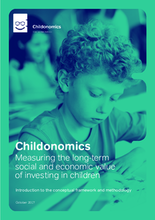The Childonomics project has developed an instrument that can help to reflect on the long-term social and economic return of investing in children and families. The instrument provides an approach to economic modelling that can be used in a number of ways to inform decision-making. It enables consideration of the different types of costs of services and approaches that support children and families (particularly those in vulnerable situations) and links them to the expected outcomes of using these services.
The introduction to the conceptual framework and methodology is published as a preliminary output on the occasion of the 2017 World Biennial Conference 2017 of the International Foster Care Organisation taking place in Malta on 1 – 4 November 2017. The paper outlines the methodology, conceptual framework, outcomes and indicators and some preliminary reflections based on the testing in Malta and Romania.
The draft methodology has been developed building on elements of social return on investment methods and models for appraising economic return on investment. It has been tested as far as possible in Malta and Romania. The countries were selected by Eurochild because both recently embarked on policy reforms, which emphasize the need to invest in prevention and early intervention.
The project uses a rights-based foundation and has a particular focus on supporting children, families and communities in order to prevent and reduce any form of developmental delay, harm and, especially, the unnecessary separation of children from their parents.
It is anticipated that governments and/or nongovernmental organisations can use the instruments developed through the Childonomics project in a variety of ways as part of wider policy and strategic planning processes. Applying this methodology also raises awareness of the knowledge gaps and can help inform future data collection.

